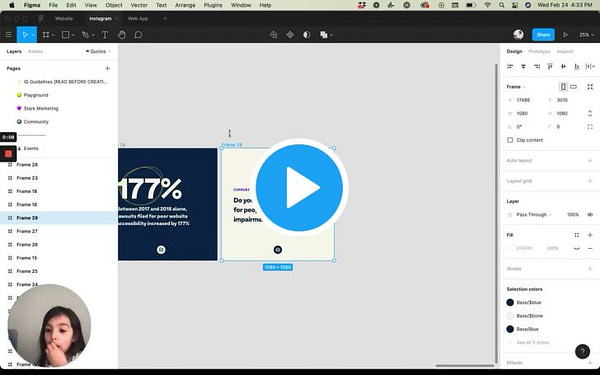Building and actually employing a fully remote team where everyone benefits
Thoughts Brewed: Edition No. 13
Hey everyone,
February is what I officially consider a month of press, publications, and preparation. There was a lot of cleaning up being done, and we’re heads down plotting about some big things happening starting in March. I’m also officially off for the next few days, so I’m excited to ignore email, read, and watch people on social media choose chaos.
This month, I wrote my first article for FastCompany on 4 reasons why hiring disabled workers is good for business, which details the importance of hiring individuals with disabilities, and how refusing to is killing your business. Techli featured me as one of their 21 Creative Innovators to Watch in 2021. And I was interviewed by the 150sec publication about our big mission at Stark and how there’s beauty in accessibility.
I get a ton of questions on a regular basis about building an inclusive remote team. For today’s writeup, I want to focus on the first crucial touchpoint of success: hiring a fully distributed team. Oh and I worked with the amazing folks at Boundless to snag all of my readers (yes, you!) a special offer to help grow your remote teams! Check it out at the bottom of the post ❤️ Let’s dive in…
Building and actually employing a fully remote team where everyone benefits

…so that tweet got a bit of engagement?
Just to table set, I think there are a million different ways to build a company. No recipe is the same. However, there is a right way and a wrong way to build a fully distributed team, and that starts with employment versus contracting.
To be clear, contracting is something that happens often in any type of company. But since we’re talking about us (early stage, venture-funded), I’ll use this stage and further as the example. When you hire people remotely the quick solution is to contract them. And in various cases, this is okay. But with that, they take on giving you their 100% as a team member even though you’re not giving them the 100% of what they need as a team member from an employer. In other words, they’re responsible for taking on the additional burden of taxes, they don’t get health insurance or any other sort of long-term benefits that they generally get from being on the team, they aren’t granted the same vacation days or work hours as everyone else, but they give you their 100%.
I think the fact that we actually employ our team members rather than contracting adds a little bit of difficulty to the equation — but there’s simply no other option I see as being done in good conscience so long as you’re a company with the means. It comes down to stage and funds often.
So at Stark when we say we are a fully distributed team we mean that you are joining a team as an employee from whatever country in the world you’re in. Did you know that in many countries in the EU it’s actually illegal to have someone work more than certain hours per week since there IS a social safety net they can tap into? But you know who cannot? Contractors.
Given that, we’re cognizant of the countries that we can support and we do that with the support of Boundless—an Irish-based startup making remote employment easier for teams. Boundless enables teams to compliantly employ folks in a growing number of countries, and handle payroll, tax filings, and all of the logistical, administrative, and legal nightmare stuff in minutes. And it’s a hell of a support system. They become an extension of your team, supporting employees with any questions they may have about their payroll, payslips, benefits or employee rights in their country. It’s been an absolute pleasure working with them and I have trusted them every step of the way to take great care of our people’s legal employment, wherever in the world they are. Much like Stark, Boundless have taken on a really dated market and figured out the framework that enables people to work smarter and with more ease. Best of all? There’s country-specific education through and through—a pillar to working more efficiently. Having that has helped navigate conversations with team members, especially around benefits where we as employers have a duty to set them up for success.
Ultimately, it’s the logistics that sometimes get a little bit muddy because there are drastic differences between benefits on a country by country basis, and we want to make sure everyone has equitable benefits. But in order to do that, there needs to be a solid baseline. Which is why we don’t use the United States of America as a benchmark for the benefits that team members should get. We actually use Germany as our benchmark.
Right now, we have team members in the United States, Ireland, Portugal and will be expanding to new countries very soon. So we look at each country guide (here’s an example of Portugal’s guide, where one of our Software Engineers is based)and say: “OK, what’s the baseline in this country? Who has the better benefits, how can we always improve here?” And in some cases, there are hard limits. You can’t rewrite law just because you got funded lol—though I’m sure some of the tech bros may disagree (yeah, that one…). But generally, no sound country ever complained about giving employees better benefits. So with us, you get 30 days vacation, you get your health insurance, paternity/maternity leave, etc. And that includes the US where very little to none is actually mandated (Please don’t get me started on this [yet] though before I blow a gasket.)
There’s a lot of making sure that the playing field is even so that individuals in one country aren’t getting [significantly] more than the other simply because of local laws. We want the team to have equal benefits, we want them to be equally healthy in mind and body, and we want their family to be healthy as well. And while we can’t compete with the big giants in a lot of what we give, I’d argue our overall benefits of working from anywhere in the world with paid for health insurance, new hardware, and what you need to do your best work far supersede ping pong tables and a laundry service.
We aren’t a company working out of our dorm rooms in college. We’re partners and parents that have family members and spouses.
And in order for team members to come to work healthy, their home needs to be healthy, too. At Stark we try to really set the stage—especially knowing you’re in pandemic life working from home—to make sure everything is safe and sound so you can focus and give your all in each part. That starts with putting our money toward people who join. When you invest in people (and this is a testament to what we do at Stark in general as a product) people invest back. So if I had to pick that would be the time-intensive and heavy lifting of building a remote team.
People first always though. Their success is worth it.
Are you building a remote, fully-distributed team? Did 2020 throw you into the deep end and now you’re struggling? Tell me about your experience so far!
Special Offer
As I mentioned above, I worked with the amazing folks at Boundless to snag all of my readers a special offer to help grow your remote teams. With my special offer code, you get a Reduced Fee: 6% of total payroll, for life.
…yes, for life. And so much more that comes with simply being a Boundless customer. Go snag your deal now and make that first crucial touchpoint a successful one.
What I’m reading…
The Ride of a Lifetime by Robert Iger
Only 15 pages in and you’ll already find you’re kicking yourself in the ass if you went to school for an MBA. This memoir on business and leadership is a masterclass bundled into a book—Robert Iger’s lessons learned from 15 years as the CEO of the Walt Disney Company.
“At its essence, good leadership isn’t about being indispensable; it’s about helping others be prepared to possibly step into your shoes—giving them access to your own decision making, identifying the skills they need to develop and helping them improve, and, as I’ve had to do, sometimes being honest with them about why they’re not ready for the next step up.”
I’ve (along with Michael, our CTO and my co-founder) spent the last few weeks thinking about what the next hires, roles, milestones, and more look like for Stark. We’re prepping for what’s coming, and are so excited to do so. When people ask “How are things?” my first reply is “I’m exhausted, but I’m having the time of my life.” and it’s true. The role of a leader, specifically a CEO, comes with challenges like no other, and I’m comfortably uncomfortable learning on the job.
This book hit spot on and articulates not just what makes a great company, but the leadership necessary to build one. Memoirs are the closest we can get next to diaries, and in turn picking someone’s brain on every question we have. My preference since I can’t get a 1:1 meeting with these folks…yet 😜
If you like this, you’ll probably like Shoe Dog by Phil Knight as well.
Worth thinking about…
“Winning has a price. And leadership has a price. So I pulled people along when they didn’t want to be pulled. I challenged people when they didn’t want to be challenged. And I earned that right … Once you join the team you live at a certain standard that I play the game (at) and I wasn’t going to take anything less … I wanted to win but I wanted them to be a part of it as well.”
— Michael Jordan in The Last Dance
What do you think leads to mediocrity?
I tweeted this question and though it didn’t get many “likes”, it received a swarm of responses. I have my own thoughts, of which I’ll more than likely share, but I wanted to get a shared understanding of how folks from all over the world think about this. Is it unified? Is there a Venn diagram to be made?
So I leave you with that question to sit on, and hope you’ll share thoughts with me in the comments!
On my mind
The content of what people do is governed by the conscious they carry. Be wise about who you personally and professionally surround yourself with.
Next generation of software designers
Could my kid be the youngest software designer? 🤔😜😂 Check out Emma in action as she uses Stark in Figma (and is conscious of accessibility issues!), and uses Loom to demo it!


As always, thanks for reading! And if you have any questions about the topics I’ll be covering, go ahead and AMA by replying to this email or pinging me on Twitter. If I don’t have the answer, we’ll deep dive together.
I appreciate you. And until next time…





